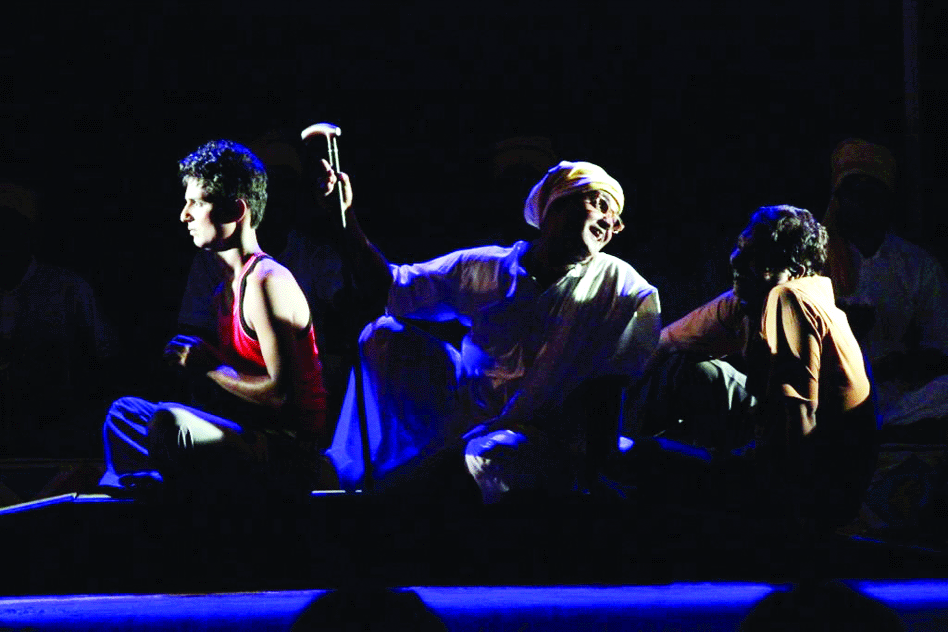Gabarghichor was recently staged during the Mahindra Theatre Festival. Its director told Utpal K Banerjee about the similarity between the works of Bertolt Brecht and Bhikhari Thakur, who originally wrote the play based on an old folklore of Bihar
Beyond the pale of Hindi’s standard Khari Boli and its 19th century literary dialects of Brajabuli and Awadhi, there lie the large tracts of Bihar and Jharkhand where dialects like Maithili, Maghai and Bhojpuri are widely spoken and practised.
In this belt was born Bhikari Thakur (1887-1971): a playwright, lyricist, actor, folk-dancer, folk-singer and social activist, who was popularly known as the Shakespeare of Bhojpuri. Originally belonging to a barber-family, his literary creations included dramas (Bidesiya, Beti-Bechawa, Bidhawa-Bilaap) and songs that continue to be appreciated and performed even today. His play Gabarghichor is based on an old folklore of Bihar and is widely performed.
Gabarghichor, presented by Fact Art and Cultural Society from Begusarai, Bihar, was the curtain-raiser of the Mahindra Theatre Festival. Directed by the NSD-alumnus Pravin Kumar Gunjan, the play is about Galijbo, a married woman living with her 15-year-old son Gabarghichor, whose absent husband works in Kolkata and seldom returns to the village. In one of his rare visits, the husband discovers the son whom he did not know about. He immediately claims the boy to accompany him to the city for work, but is stoutly opposed by Galijbo. Soon, another villager appears, claiming the boy as his biological father. Before an astounded panchayat, the woman — without much embarrassment — confesses to her liaison with the other villager in husband’s long absence. It then becomes a free-for-all among the two spiteful men, and Galijbo stubbornly refusing both, not to let the boy go anywhere. In the true Brechtian manner — reminiscent of the legal decision in Caucasian Chalk Circle of letting the child be pulled apart by the two claimant women — the Sarpanch orders the boy to be cut into three equal pieces and distributed among the three. With a professional swordsman about to pounce on Gabarghichor, the woman gives up her claim and has the hapless child finally saved — again true to the Brechtian play’s spirit.
The play is performed like an opera; with soulful singing in a stylised folk form, only occasionally interspersed with dialogue. In a minimal set, the background concert-players — as in a nautanki — seem to do a great job. As though to re-affirm the Brechtian roots of “alienation” effect, the play abruptly stops in the midstream; the dramatic personae express their ennui and indulge impromptu in an uninhibited display of filmy songs and pelvis-gyrating dances; and then — equally suddenly — they resume their acting stances, as if nothing happened! In the Bihar group’s production: mentioning neither Brecht nor his The Caucasian Chalk Circle of 1944 vintage, leave alone any Brechtian allegiance: the diversion appeared unexpected.
Excerpts of an interview with the director.
As the turning point of the play, Galijbo’s strong statement about the child’s illegitimacy must have been quite revolting to the then society. Was it part of Bhikhari’s original scriptIJ
Very much so. The play deals with the grave situation of women in those times. It was done in a lighter vein with very little remorse or despair, since back then, theatre was just a form of entertainment.
How about The Caucasian Chalk Circle: the prime reference-point for your playIJ
Both Bhikhari Thakur and Bertolt Brecht were writing about the same time in the mid-20th century, although in two different countries. I am not aware how Bhikhari came to know about the seminal incident in Brecht’s story since he does not mention it anywhere.
How did you think about suddenly introducing Brechtian alienation, in the course of the playIJ
It was done deliberately. I thought the music and the dialogue in the play were going on for too long and a diversionary interruption may not be too bad an idea.
Your music was most lively..
The music is entirely folk-based, culled from around Chhapra in the Bhojpur region.
What’s the play’s relevance in our timeIJ
Throughout my life, I’ve been witness to many situations, where women are just expected to sacrifice and are seen as inferior. Sadly, these situations are still prevalent even today, which is a matter of huge concern. This play is in support of women and I have expressed my own feelings using drama as a tool.
























